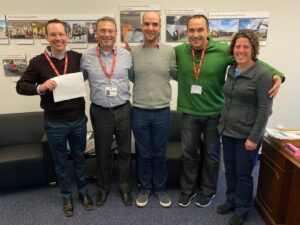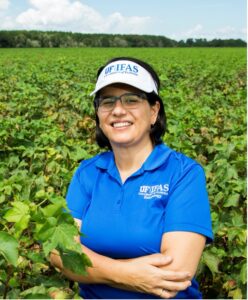
Message from the Executive Committee
A spectacular carinata season so far with the crop thriving after a series of frost, freeze, and hard freeze events in the region. Timely planting had a big role to play. We are excited to get to the end of the season, and report back on: how all our hybrid lines compare with each other; how we can effectively replace inorganic nitrogen sources with more sustainable organic sources; carinata lines that can yield more for less; development of efficient pest management strategies; and what our beef and dairy cows think about their high-protein carinata diet.
Meanwhile, we were reminded that SPARC is working on “…21st century solutions to 21st century problems..”. One of the many things that statement means is that we are using multi-faceted, systems-level approaches to address the issues that face our natural resources. While there may be various conflicting ideas out there on how to do it, we are charged with continuing to do what we have been doing—produce sound scientific data, get information out, receive & process feedback, repeat.
SPARC Stories
Building a Resilient Global Bioeconomy Through Supply Chain Analytics
arinata? How do we create multiple pathways for sustainable aviation fuel, renewable diesel, high-protein animal feed, and other critical bioproducts to get from the agricultural community (raw material/feedstock) to end consumers who rely on them? It takes the skills, expertise, and teamwork of experts in agriculture, chemistry, engineering, and others working together to develop the raw material into its various coproduct forms. It also requires an ability to blend the science and engineering with the key business processes necessary to make it a viable reality for all stakeholders. Such processes and concerns include things like production locations, capacity constraints, multi-modal transportation optimization, transloading and transfer costs, choke points, incentives, carbon output, and many more. Integrating all of this into a systems view that helps stakeholders benefit economically, environmentally, and socially is paramount to the SPARC supply chain work led by the University of South Florida.
When faced with the challenge of creating supply chains for a brand-new carinata bioeconomy, where does one begin? The supply chain team started by engaging with and carefully listening to all SPARC stakeholders. These included Applied Research Associates (ARA), the Commercial Aviation Alternative Fuels Initiative (CAAFI), Nuseed, and scientists and researchers critical to the SPARC mission. The interviews and discussions provided a lens through which key aspects of the supply chains and their components could be envisioned. Processing requirements, carbon footprints, raw material producers, processers, destinations, and other elements were evaluated. This activity formed the basis through which the supply chain team could code several logistics network optimization models that would go on to serve as the foundation for further refinement and analysis.
The SPARC supply chain effort has helped forge new pathways for work of this type. While various algorithmic approaches and decision frameworks have been used for transportation and other supply chain management problems, the SPARC supply chain team has collaborated with experts at the U.S. DOT Volpe Center in Cambridge, Massachusetts to apply a former policy tool to their work. The Fuel Transportation Optimization Tool (FTOT) developed by the Volpe Center is capable of tapping into data from numerous federal databases, and through some extensive computer modeling involving more than 365,000 roadways, rails, marine, and pipe logistics networks, provide critical mapping and analytical metrics useful for decision-making. This was the first ever bottoms-up application of FTOT work of this nature, helping the SPARC supply chain effort to be a nationally recognized model in distribution analysis, while also allowing for the growth of capabilities within FTOT that will benefit future projects.
Follow-on work includes resilience tests of supply chain networks to develop insights into the effects of potential perils, and assist in proper supply chain risk planning. Additionally, substantial work is underway to analyze the impact of first mile-last mile considerations, which could re-shape decisions surrounding the most optimal supply chains. As much as 40%+ of the overall transportation costs can occur at these extreme ends of a supply chain, necessitating a deeper examination for supply chains related to carinata. The collective efforts of SPARC and its supply chain team are helping to ensure successful commercialization of carinata in the Southern US and a more sustainable future for all.

SPARC Supply Chain and U.S. DOT Volpe Center Teams Following a Multiday Research Summit
SPARC Member Spotlight
 John Field is a Research Scientist at the Colorado State University’s (CSU) Natural Resource Ecology Laboratory. He received his BSc from Case Western Reserve University, and worked in the private sector doing R&D on small-scale solid oxide fuel cell power systems prior to pursing a PhD through the CSU Department of Mechanical Engineering. He had the distinction of pursuing the PhD program as a fellow in NSF’s “Multidisciplinary Approaches to Sustainable Bioenergy” Integrative Gradate Education and Research Traineeship (IGERT) program.
John Field is a Research Scientist at the Colorado State University’s (CSU) Natural Resource Ecology Laboratory. He received his BSc from Case Western Reserve University, and worked in the private sector doing R&D on small-scale solid oxide fuel cell power systems prior to pursing a PhD through the CSU Department of Mechanical Engineering. He had the distinction of pursuing the PhD program as a fellow in NSF’s “Multidisciplinary Approaches to Sustainable Bioenergy” Integrative Gradate Education and Research Traineeship (IGERT) program.
He studies the climate mitigation potential of bioenergy systems at the intersection of ecosystem process modeling, life cycle assessment, and sustainable land use planning. He has contributed to research projects on switchgrass cultivation in the Great Plains, biochar production in the Colorado Front Range, gasification of agricultural wastes in Southeast Asia, and identification of marginal lands across the US. He is also the project manager for the Bioenergy Alliance Network of the Rockies (BANR), another USDA-NIFA consortium just like SPARC.
John is an integral part of the System Metrics team in SPARC where his work intersects heavily with the feedstock team and others within the modeling team. John spearheaded the DayCent modeling activities in SPARC to get a comprehensive understanding of GHG mitigation and C sequestration potential of crop rotations incorporating winter carinata in the Southern United States. John brings an interesting mix of skills to the SPARC program. A mechanical engineer by training, his interest in the carbon cycle and life cycle assessments in biofuel and bioenergy systems, and carbon negative technologies, veered him toward ecologists and cropping systems research to apply his expertise with a deeper understanding of the dynamics in the natural world. He has several accomplishments under his belt. One that he is especially proud of is where he was involved in studying small-scale biomass gasification systems deployed at rural rice mills in Cambodia. When John isn’t writing or coding, he likes to be hiking or skiing in the mountains of Colorado.
He and his girlfriend spend all of their free time outdoors, hiking, backpacking, and trail running. They enjoy backcountry skiing or snowshoeing in the right season.
 Silvana Paula–Moraes is an Assistant Professor at the University of Florida’s West Florida Research and Education Center, Jay, FL. She is an agronomic engineer by training with a Masters in Entomology from Brazil, and a PhD in Entomology from the University of Nebraska, Lincoln. The main goal of her research program is to contribute to the advancement of pest management science and the proactive management of resistance of pest to insecticides and transgenic plants. Her research focuses on lepidopteran pest ecology and behavior as it applies to Integrated Pest Management (IPM) and Insect Resistance Management (IRM) in row crops. She also conducts pest risk analysis to characterize the invasive potential and mitigation of invasive species. Her research program on the ecology and management of lepidopteran pests is international in scope, as she collaborates with scientists from around the world to solve pest problems locally in the Florida Panhandle as well as at a broader international scale. Especially important is the aspect of her research that develops dynamic economic thresholds in relation to insect related crop damage.
Silvana Paula–Moraes is an Assistant Professor at the University of Florida’s West Florida Research and Education Center, Jay, FL. She is an agronomic engineer by training with a Masters in Entomology from Brazil, and a PhD in Entomology from the University of Nebraska, Lincoln. The main goal of her research program is to contribute to the advancement of pest management science and the proactive management of resistance of pest to insecticides and transgenic plants. Her research focuses on lepidopteran pest ecology and behavior as it applies to Integrated Pest Management (IPM) and Insect Resistance Management (IRM) in row crops. She also conducts pest risk analysis to characterize the invasive potential and mitigation of invasive species. Her research program on the ecology and management of lepidopteran pests is international in scope, as she collaborates with scientists from around the world to solve pest problems locally in the Florida Panhandle as well as at a broader international scale. Especially important is the aspect of her research that develops dynamic economic thresholds in relation to insect related crop damage.
Silvana has held several positons of importance in the IPM realm including as a member of the IPM/IRM group in the Brazilian Ministry of Agriculture, and a panelist on the EPA Federal Insecticide, Fungicide, Rodenticide Act (FIFRA) scientific advisory panel. In SPARC, she is studying the effect of arthropod pests on carinata growth and yield. She plays an active role in the pest management team, which is working proactively on developing management strategies for successful commercial carinata production.
During her free time, she enjoys cooking, gardening, and spending time with her family. She is a hardcore dog person and loves her three-year old golden retriever “Grace” and the one-year old golden doodle “Joy”.
 Angela Post is an Assistant Professor and Extension Specialist at North Carolina State University (NCSU). She served three years as the Small Grains Weed Scientist at Oklahoma State University before coming back to North Carolina as faculty in the NCSU Crop & Soil Sciences department. Angela has a BS in Botany, Medicinal Ethnobotany and Biological Sciences and a Masters in weed science all from NCSU, after which she earned her doctorate also in weed science at Virginia Tech. Her extension responsibilities include working with North Carolina growers in winter grain production and other crops of emerging interest. She has a wide variety of crops in her portfolio including small grains such as wheat, oats, triticale, barley, canola, and also grain sorghum and industrial hemp.
Angela Post is an Assistant Professor and Extension Specialist at North Carolina State University (NCSU). She served three years as the Small Grains Weed Scientist at Oklahoma State University before coming back to North Carolina as faculty in the NCSU Crop & Soil Sciences department. Angela has a BS in Botany, Medicinal Ethnobotany and Biological Sciences and a Masters in weed science all from NCSU, after which she earned her doctorate also in weed science at Virginia Tech. Her extension responsibilities include working with North Carolina growers in winter grain production and other crops of emerging interest. She has a wide variety of crops in her portfolio including small grains such as wheat, oats, triticale, barley, canola, and also grain sorghum and industrial hemp.
Her program specializes in developing best management practices for these crops in dynamic crop rotations and weather variability situations. She manages a successful extension program through active stakeholder engagement and dissemination of her research via extension presentations, field days, and various social media outlets. She oversees several carinata studies within SPARC, including fine-tuning the planting date for carinata and screening for frost tolerant carinata genotypes. Her efforts in SPARC are primarily geared toward enhancing carinata success in the northern segments of the southern United States. Angela is very engaged with several scientific communities, especially weed science societies at the national and regional level, through her service various capacities. Few of these include member of the Science Policy Committee, Chair of the Legislative and
Regulatory Committee, Vice-Chair of the Wheat Initiative Agronomist’s community.
Angela is a youth leader for the Cub Scouts and is mom to two girls that are both active in the local all-female Boy Scout Troop. The family of four spend a lot of time outdoors, hiking and camping. At home she enjoys vegetable gardening, home canning and preserving, and animal husbandry. The family has a small flock of laying hens and two breeding pairs of meat rabbits. All of these hobbies must surely keep Angela busy when she is not either planting, or harvesting, or providing agricultural solutions to her clientele in her native state of North Carolina.
News
SPARC graduate students “sparc”-led at the 2020 Virtual ASA-CSSA-SSSA Tri-Society International Annual meetings. Congratulations to the winners Joseph Iboyi Mahesh Bashyal and their advisor Mike Mulvaney. Keep it up!!
1st place:
J.E. Iboyi, M.J. Mulvaney, I.M. Small, M. Bashyal, R.G. Leon, K.S. Balkcom, P. Devkota. 2020. Genotypic Variation in NUE Among Carinata Genotypes Differing in Seed Yield. ASA-CSSA-SSSA International Annual Meeting, Nov. 9-13, 2020.
2nd place:
M. Bashyal, M. J. Mulvaney, D. Lee, J.E. Iboyi, R.G. Leon, G. Maltais-Landry, C. Wilson, K.J. Boote. 2020. Brassica carinata biomass, yield and seed chemical composition response to nitrogen rates and timing on southern coastal plain soils in the United States. ASA-CSSA-SSSA International Annual Meeting, Nov. 9-13, 2020.
Events
(All events are being planned as virtual events)
• 2nd SPARC Student Exchange led by Dr. George Philippidis-February, 2021 (Exact date TBD)
• SPARC All-Teams Meeting-April, 2021 (Exact date TBD)
• The 8th Carinata Biomaterial Summit & 4th SPARC Annual Meeting to be held on July 20-22, 2021.
Details to follow.



















